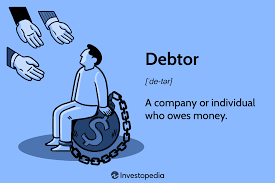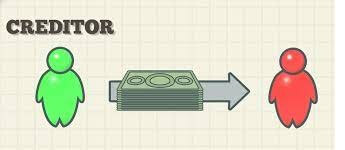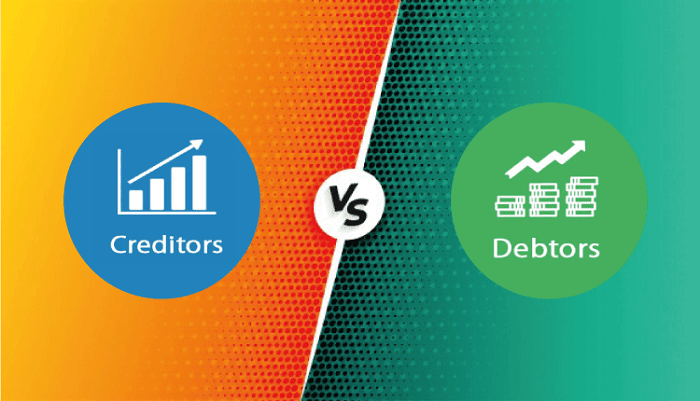Difference between Debtors and CreditorsDebtorsDebtors are individuals or entities who owe money to another party. This can include individuals who have taken out loans, credit card balances, or other forms of credit. Businesses can also be debtors, such as when they take out loans to fund their operations or make purchases on credit. 
There are several types of debtors, including secured debtors and unsecured debtors. Secured debtors have taken out loans or credit that is backed by collateral, such as a home or car. If they are unable to repay the debt, the lender may repossess the collateral to cover the outstanding balance. Unsecured debtors, on the other hand, have taken out loans or credit without collateral. If they are unable to repay the debt, the lender may take legal action to collect the outstanding balance, but they do not have the right to repossess any property. Debtors may also be classified as current or delinquent. Current debtors are those who are up to date with their payments and have not missed any deadlines. Delinquent debtors, on the other hand, have missed payments or failed to meet their financial obligations. Delinquent debtors may face penalties, such as late fees or higher interest rates, and their credit scores may be negatively affected. There are several reasons why someone may become a debtor. Some people may need to take out loans or credit to cover unexpected expenses, such as medical bills or home repairs. Others may use credit to make purchases they cannot afford to pay for upfront, such as a car or home. Businesses may also need to take out loans or credit to fund their operations, purchase inventory, or invest in new equipment. While debt can be a useful tool for achieving financial goals, it can also become a burden if it is not managed properly. Debtors who are unable to repay their debts may face serious consequences, such as legal action, wage garnishment, or bankruptcy. Additionally, excessive debt can damage a debtor's credit score, making it harder for them to obtain credit in the future. To avoid becoming overwhelmed by debt, it is important for debtors to create a budget and stick to it, make payments on time, and avoid taking on more debt than they can afford to repay. Debtors who are struggling to manage their debts may also consider working with a financial counselor or debt management service to develop a plan for paying off their debts and improving their financial situation. CreditorsCreditors are individuals or entities that have lent money or extended credit to another party. This can include banks and other financial institutions that provide loans or credit cards, as well as individuals or businesses that have provided goods or services on credit. 
Creditors can be classified as secured or unsecured. Secured creditors hold a legal claim to specific property or assets as collateral in case the debtor fails to repay the debt. For example, a mortgage lender is a secured creditor because they have a lien on the property being purchased. If the borrower defaults on the loan, the lender can seize the property to recover the outstanding balance. Unsecured creditors, on the other hand, do not have a legal claim to any specific property or assets. If the debtor fails to repay the debt, unsecured creditors may take legal action to collect the outstanding balance but do not have the right to seize any property. Creditors may also be classified as revolving or non-revolving. Revolving creditors provide a line of credit that the borrower can draw upon and repay as needed, such as a credit card or home equity line of credit. Non-revolving creditors provide a fixed amount of credit that must be repaid in installments over time, such as a personal loan or auto loan. There are several reasons why someone may become a creditor. Financial institutions lend money to individuals and businesses to earn interest and fees. Retailers and other businesses may extend credit to customers to increase sales and customer loyalty. In some cases, individuals may lend money to family or friends in need, acting as a creditor. While being a creditor can be profitable, it also involves risk. There is always a chance that the debtor will fail to repay the debt, leaving the creditor with a loss. To mitigate this risk, creditors may perform credit checks and require collateral or co-signers to secure the loan. They may also charge higher interest rates or fees to borrowers with a higher risk of default. In cases where the debtor is unable to repay the debt, creditors may take legal action to recover the outstanding balance. This can involve filing a lawsuit, obtaining a judgment against the debtor, and using legal remedies such as wage garnishment or bank account seizure to collect the debt. Overall, creditors play an important role in the economy by providing loans and credit that help individuals and businesses achieve their financial goals. However, it is important for creditors to carefully evaluate the risk involved in lending money and take steps to protect their investments. Difference between Debtors and CreditorsDebtors and creditors are two common terms used in accounting and finance. However, there are significant differences between the two: 
Definition Debtors are individuals or entities who owe money to a company or individual. They are also referred to as accounts receivable. On the other hand, creditors are individuals or entities to whom a company or individual owes money. They are also referred to as accounts payable. Role Debtors and creditors play opposite roles in financial transactions. Debtors are individuals or entities that owe money to a company or individual, while creditors are individuals or entities that are owed money by a company or individual. Nature of Account Debtors are assets to a company or individual as they represent future cash inflows. They are recorded on the balance sheet of a company or individual as accounts receivable. Creditors, on the other hand, are liabilities to a company or individual as they represent future cash outflows. They are recorded on the balance sheet of a company or individual as accounts payable. Timeframe Debtors and creditors have different timeframes associated with them. Debtors are typically expected to make payments within a specific time period, which is usually 30, 60, or 90 days. The timeframe for payment is typically agreed upon at the time of sale or transaction. Creditors, on the other hand, are usually given a longer time period to make payment, which is typically between 30 to 90 days. Payment Terms Debtors and creditors have different payment terms associated with them. Debtors are required to make payment on or before the due date. Failure to make payment on time can result in penalties, interest charges, and damage to the credit score of the debtor. Creditors, on the other hand, are typically given payment terms by the entity or individual to whom they are owed. These payment terms may include discounts for early payment or penalties for late payment. Risk There is a difference in risk associated with debtors and creditors. Debtors represent a risk to the company or individual as there is a possibility that they may not make payments on time or at all. This can result in a loss for the company or individual. Creditors, on the other hand, represent a risk to the debtor as failure to make payment on time can result in penalties, interest charges, and damage to the credit score of the debtor. Accounting Debtors and creditors are treated differently in accounting. Debtors are recorded as assets on the balance sheet of a company or individual. When a sale is made on credit, the debtor is recorded as an account receivable. When the payment is received, the account receivable is reduced, and cash is increased. Creditors, on the other hand, are recorded as liabilities on the balance sheet of a company or individual. When a purchase is made on credit, the creditor is recorded as an account payable. When the payment is made, the account payable is reduced, and cash is decreased. Debtors v/s Creditors
Description of the above difference table-
ConclusionIn conclusion, while both debtors and creditors represent financial relationships between a company and other individuals or entities, they represent different aspects of the company's financial position. Debtors represent an asset for the company, while creditors represent a liability. Debtors are usually customers who have not paid their bills or invoices, while creditors are usually suppliers or lenders who have extended credit or loans to the company. Understanding the difference between these two terms is important for managing a company's finances effectively and making informed business decisions. In summary, debtors and creditors are two different entities in accounting and finance. Debtors are individuals or entities that owe money to a company or individual, while creditors are individuals or entities that are owed money by a company or individual. Debtors represent future cash inflows and are recorded as assets, while creditors represent future cash outflows and are recorded as liabilities. Debtors are required to make payment on or before the due date, while creditors are given payment terms by the entity or individual to whom they are owed. Failure to make payment on time by a debtor can result in penalties, interest charges, and damage to the credit score of the debtor. Failure to make payment on time by a creditor can result in penalties and interest charges
Next TopicDifference between
|
 For Videos Join Our Youtube Channel: Join Now
For Videos Join Our Youtube Channel: Join Now
Feedback
- Send your Feedback to [email protected]
Help Others, Please Share










